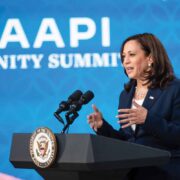
UNITED States Vice President Kamala Harris proclaimed that Asian Americans “have the right to be recognized as Americans, not as the other” and can turn the pain of the past year of racially motivated violence into action.
Speaking at the virtual AAPI Unity Summit hosted by AAPI Victory Alliance on Wednesday, May 19, Harris condemned the rise in anti-Asian hate crimes and incidents since the start of the pandemic.
She referenced the shootings at three Atlanta-area spas, which took the lives of six Asian women, and the subsequent meeting with community leaders in the area.
“I spoke then about how Asian Americans have the right to be recognized as American, not as the other. Not as them, but as us,” Harris said, speaking from the South Court auditorium in the Eisenhower Executive Office Building. “In America, I do believe a harm against any one of us is a harm against all of us, and we should all then recognize that interconnection between each of us.”
Harris’ remarks came a day after the House of Representatives passed the COVID-19 Hate Crimes Act, authored by Sen. Mazie Hirono of Hawaii and Rep. Grace Meng of New York, which would direct the Department of Justice to expedite the review of such crimes and make reporting tools available in multiple languages. (The vice president was also present on Thursday, May 20 as President Joe Biden signed the act into law.)
“I know this past year has been marked by pain, so much pain for so many, and in particular, members of the AAPI community. When we saw the targeting, when we’ve seen this hate, when we’ve seen the viciousness of it all. We all see that, and as a member of this community, I share in that outrage and grief,” said Harris, who in addition to being the nation’s first woman and Black vice president, is the first Asian American in the role.
Stop AAPI Hate, a reporting center started during the pandemic, received 6,603 anti-Asian hate incidents from March 19, 2020 to March 31, 2021. Of that number, 2,410 hate incidents occurred in the first three months of 2021.
The main types of discrimination included verbal harassment (65.2%), shunning (18.1%) and physical assault (12.6%), and primarily took place in public areas and businesses.
Chinese individuals have reported more hate incidents (43.7%) than other race or ethnic groups, followed by Koreans (16.6%), Filipino (8.8%) and Vietnamese (8.3%).
“I believe we have an opportunity now to turn that pain into action. To turn that pain, that righteous anger because of the injustice of it, we have an opportunity to turn that into power,” Harris said in her remarks.
The vice president urged the community to fight “against attacks on voting rights” and called on lawmakers to pass the For The People Act and John Lewis Voting Rights Advancement Act.
“More than 360 bills to restrict the right to vote have been introduced in nearly every state in the United States of America. Many of these bills, specifically target vote by mail, and let’s be clear about this, [they] specifically target vote by mail while 64% of Asian Americans vote by mail,” she said.
Voter turnout among Asian Americans, who comprise the fastest-growing bloc of eligible voters, reached a record high during the 2020 presidential election, growing 49% in 2020 to 59.5% in 2020, according to AAPI Data.
Harris also mentioned how AAPIs can “shape how we work” through unions — citing “the tradition of the Filipino farmworkers who organized in the 1960s” — and push for other protections, such as lowering the cost of childcare and other barriers to work.
Following the summit, an after-party fundraiser featured former Secretary of State Hillary Clinton, former U.S. Ambassador to India Richard Verma, journalist Lisa Ling and “Shang-Chi” actor Simu Liu, who will be the first Asian to lead a Marvel movie.
“People elected pay attention to voters, not to those who don’t. The AAPI community showed in the last presidential election what a difference you can make—and now we’ve got to keep it up,” Clinton said. “There’s elections all the time, and it can’t be one and done.”
AAPI Victory Alliance, which is dedicated to building political power among AAPIs, previously announced it will form the country’s first think tank focusing on the community’s issues.






